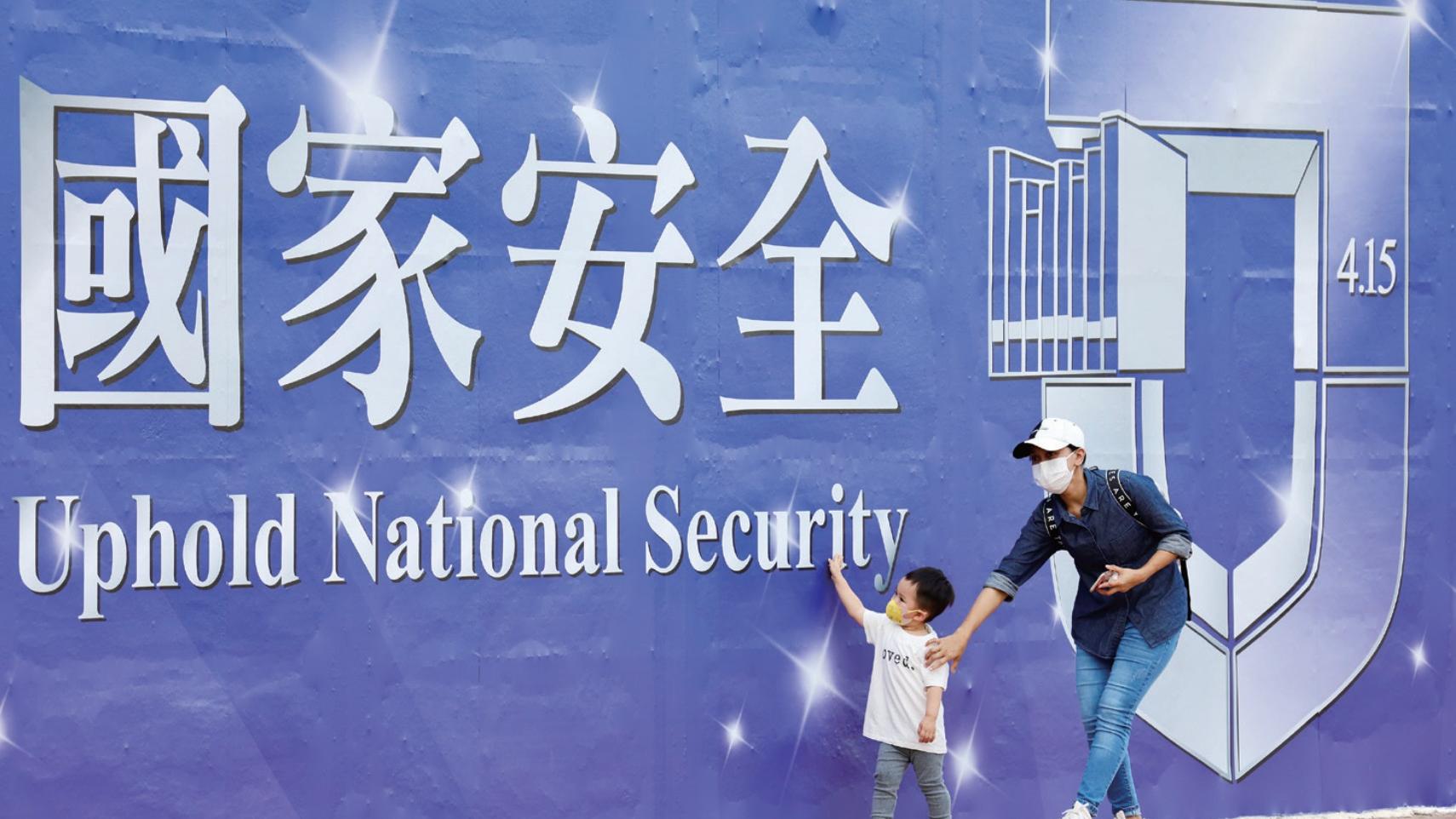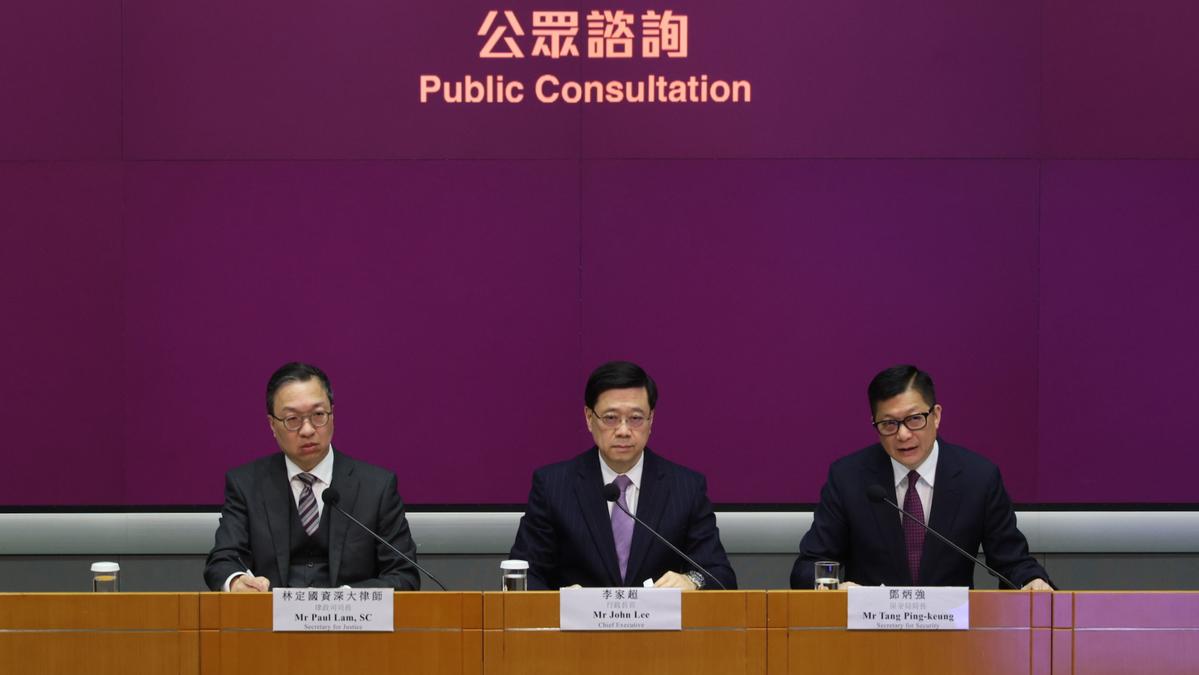 In this file photo dated April 14, 2022, a child walks past a billboard promoting National Security Education Day in Central. (EDMOND TANG / CHINA DAILY)
In this file photo dated April 14, 2022, a child walks past a billboard promoting National Security Education Day in Central. (EDMOND TANG / CHINA DAILY)
Prominent political figures and lawmakers in Hong Kong on Tuesday pledged their unwavering support in cooperating with the special administrative region government during the public consultation process in enacting national security legislation under Article 23 of the Basic Law.
They vowed to work wholeheartedly to ensure a swift and efficient completion of the legislative process.
Chief Executive John Lee Ka-chiu said on Tuesday the government will enact a brand new security ordinance to address national security risks, as the city launched a month-long public consultation exercise on legislating Article 23 of the Basic Law. The consultations on enacting the proposed “Safeguarding National Security Ordinance” will end on Feb 28.
Maria Tam Wai-chu – a former deputy director of Hong Kong’s Basic Law Committee - believes the government will make every effort to address public doubts and clarify any misunderstanding, while the month-long consultations period is sufficient for meaningful engagement and discussion
Article 23 of the Hong Kong Basic Law requires the HKSAR to enact laws on its own to prohibit seven categories of acts that endanger national security, including treason, sedition, subversion and theft of State secrets. Some of the crimes are already covered by the National Security Law for Hong Kong, which took effect on June 30, 2020, prohibiting secession, subversion, terrorist activities, and collusion with a foreign country or external elements to endanger national security.
Maria Tam Wai-chu – a former deputy director of Hong Kong’s Basic Law Committee - said the city has been significantly affected by social unrest in recent years, but the situation has persisted despite the implementation of the National Security Law for Hong Kong.
Therefore, the government must introduce more comprehensive laws and enforcement methods to safeguard social order, ensure the safety of residents, and facilitate economic development.
ALSO READ: HK begins public consultation on national security legislation
Tam urged all walks of life in the community to actively review the documents and data provided by the government, and speak out. She believes the government will make every effort to address public doubts and clarify any misunderstanding, while the month-long consultations period is sufficient for meaningful engagement and discussion.
 Hong Kong Chief Executive John Lee Ka-chiu (center), Secretary for Justice Paul Lam (left), and Secretary for Security Tang Ping-keung hold a press conference on the start of a public consultation on the legislation of Article 23 of the Basic Law at the Central Government Offices on Jan 30, 2024. (CALVIN NG / CHINA DAILY)
Hong Kong Chief Executive John Lee Ka-chiu (center), Secretary for Justice Paul Lam (left), and Secretary for Security Tang Ping-keung hold a press conference on the start of a public consultation on the legislation of Article 23 of the Basic Law at the Central Government Offices on Jan 30, 2024. (CALVIN NG / CHINA DAILY)
Senior counsel Ronny Tong Ka-wah - a non-official member of the Executive Council - said Feb 28 shouldn’t be seen as a “deadline” for the public to express their views, as residents will still have opportunities to speak up after the exercise ends. During the legislative process, lawmakers will also have the chance to voice their opinions.
Tong said it would be a challenging task for the government to explain the legislation under Article 23 to Western countries.
The government should not only uphold its constitutional duty, but also protect residents’ daily lives, commercial activities, and the civil rights of Hong Kong people. Striking an appropriate balance between these two aspects is of paramount importance, said Chan Chak-ming, president of the Law Society of Hong Kong
Chan Chak-ming - president of the Law Society of Hong Kong - said legislation under Article 23 of the Basic Law is a constitutional responsibility entrusted to the HKSAR. The government should not only uphold its constitutional duty, but also protect residents’ daily lives, commercial activities, and the civil rights of Hong Kong people. Striking an appropriate balance between these two aspects is of paramount importance, he said.
A joint statement issued by all non-official members of the Executive Council said that to effectively prevent risks and threats to national security, the government should seize the opportunity to legislate Article 23 as soon as possible.
In doing so, the government can shift its focus to economic development, enabling all sectors of society to work together for the long-term prosperity, stability, and well-being of Hong Kong and its residents.
Legislator Stanley Ng Chau-pei, who also chairs the Hong Kong Federation of Trade Unions - the city’s largest labor union - said that, given the highly precarious nature of the current international situation, enacting Article 23 of the Basic Law needs to be forward-looking and capable of addressing increasingly difficult and complex challenges.
READ MORE: Enactment of Article 23 will 'put an end to issues troubling HK'
He said the legislation should be seamlessly integrated with the National Security Law for Hong Kong, thus becoming an essential component of the comprehensive legal system and enforcement mechanism for protecting national security.
Lawmaker Jeffrey Lam Kin-fung, who represents the business sector, said the enactment of Article 23 is "good legislation" that will contribute to the stability of Hong Kong and in attracting foreign investment.
Lam said that investors he met have expressed a clear willingness to invest in the city and many agreed that, after the social unrest in 2019, Hong Kong has an actual need for legislating Article 23 to address and manage national security risks.
Sunny Tan, also a lawmaker and chairman of Hong Kong Productivity Council, said that since the implementation of the NSL, overseas enterprises and investors have experienced a resurgence of confidence in the SAR, with various cultural, artistic, sports, and exhibition events being held in the city.
The assurance of national security and social stability plays a vital role in establishing a robust and consolidated economic and business environment. This stability provides a fertile ground for the continued growth of Hong Kong as an international business hub, Tan said.


